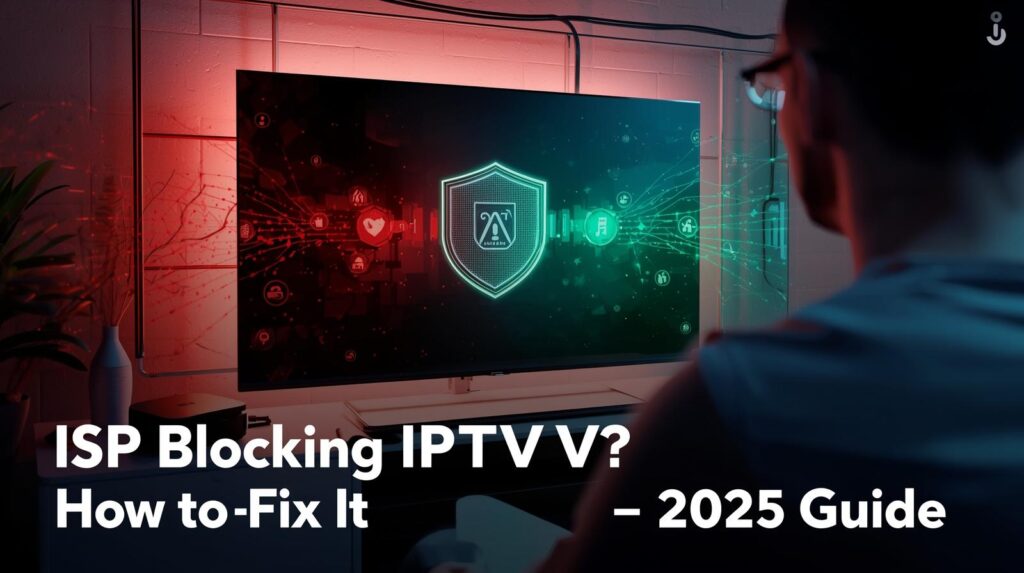Many IPTV users around the world face the same frustrating issue — their IPTV service suddenly stops working, channels fail to load or streams buffer endlessly, even when the internet speed appears strong. If this sounds familiar, there’s a strong chance your Internet Service Provider (ISP) is blocking or throttling IPTV traffic.
In this detailed guide, we’ll explain why ISPs block IPTV, how to identify if you’re affected and the most effective solutions — including VPNs, DNS adjustments and router configurations — to restore smooth, unrestricted streaming.
Understanding ISP Blocking and Throttling
ISPs have control over the flow of internet traffic across their networks. They can monitor and manage data types such as web browsing, video streaming or file sharing. When an ISP detects IPTV-related data — especially from unofficial or unverified servers — it may take one of the following actions:
- Throttling: Reducing the bandwidth available for IPTV traffic, which leads to buffering or low-quality playback.
- Blocking: Completely restricting access to IPTV servers, preventing apps or devices from connecting.
- DNS Interference: Filtering domain name requests to IPTV providers, causing “link not found” or “cannot connect” errors.
While some ISPs claim this is done to manage network congestion or enforce content regulations, many users experience these restrictions even with legitimate IPTV subscriptions.
Signs That Your ISP Might Be Blocking IPTV
Not every streaming issue is caused by ISP blocking, but several telltale signs suggest interference.
- IPTV apps or portals load slowly or fail to connect, even when other streaming apps (like YouTube or Netflix) work fine.
- Streams buffer continuously despite high internet speed results.
- Channels stop working at specific times, often during peak hours.
- The service runs smoothly when using mobile data or a different network but fails on home Wi-Fi.
- Access is restored instantly when connected to a VPN.
If one or more of these apply to you, your IPTV data is likely being restricted by your ISP.
Why ISPs Block IPTV
ISPs may restrict IPTV services for several reasons, including network management, regional licensing policies and copyright enforcement.
- Bandwidth Management
During busy hours, ISPs reduce data-heavy activities such as IPTV streaming to maintain overall network performance. - Copyright Compliance
Many ISPs are legally required to block access to certain IPTV servers that stream unlicensed content. - Regional Restrictions
Some IPTV providers broadcast content restricted to certain regions. ISPs enforce these boundaries by blocking IP addresses outside authorized areas. - Encouraging In-House Services
In some countries, ISPs also sell TV or streaming packages and may limit external IPTV usage to promote their own platforms.
How to Fix ISP Blocking of IPTV
If you’ve confirmed that your IPTV streams are being blocked, there are several methods to bypass or fix these restrictions effectively.
Use a VPN for IPTV
The most reliable and widely used solution is to connect through a Virtual Private Network (VPN). A VPN encrypts your internet traffic and routes it through a private server, hiding your real IP address and activity from your ISP.
When using a VPN:
- Your ISP cannot see or throttle IPTV data.
- Geo-restricted channels and servers become accessible.
- You gain additional privacy and protection from tracking.
Choose a VPN provider known for fast speeds and reliability. Avoid free VPNs, as they often limit bandwidth, leak DNS data or contain malware.
Recommended VPN features for IPTV:
- High-speed servers optimized for streaming
- No bandwidth or data limits
- Kill switch protection to prevent disconnection leaks
- Compatibility with Firestick android Box, Smart TVs and routers
Examples of trusted VPNs include NordVPN, ExpressVPN and Surfshark.
Change Your DNS Settings
ISPs sometimes block IPTV domains through DNS filtering. Switching to a public or custom DNS can bypass these restrictions.
Steps to change DNS on your device:
- Open your device’s Network Settings (Wi-Fi or Ethernet).
- Select Manual DNS configuration.
- Replace existing addresses with one of the following:
- Google DNS: 8.8.8.8 and 8.8.4.4
- Cloudflare DNS: 1.1.1.1 and 1.0.0.1
- OpenDNS: 208.67.222.222 and 208.67.220.220
- Restart your router or device.
After updating the DNS, test your IPTV app again. If the issue was related to DNS blocking, streams should load normally.
Use a Different Internet Connection
A simple way to verify ISP blocking is by switching to mobile data or a different Wi-Fi network. If IPTV works on a mobile hotspot but not your home connection, the problem lies with your ISP.
While this isn’t a permanent fix, it helps confirm the source of the issue before applying other solutions such as VPNs or DNS changes.
Configure Your Router for IPTV Optimization
Some modern routers include built-in VPN and DNS features that can be configured to bypass ISP interference. Advanced users can:
- Install VPN firmware (like DD-WRT or OpenWRT) on compatible routers.
- Add DNS manually to router-level settings.
- Disable features such as “ISP DNS Proxy” or “Parental Filtering,” which sometimes block IPTV URLs.
This approach ensures all devices connected to your home network benefit from unthrottled IPTV streaming without configuring each individually.
Use an Alternate IPTV App or Player
Certain IPTV players handle streaming protocols more efficiently and can reconnect to servers even when interference occurs. Apps such as TiviMate, IPTV Smarters or XCIPTV Player offer advanced buffering and server-switching options that can help maintain playback under partial throttling.
How to Prevent Future ISP Blocking
Once you’ve restored IPTV access, consider long-term strategies to prevent future interruptions.
- Always use a VPN before launching IPTV applications.
- Avoid public or unverified IPTV sources that attract ISP scrutiny.
- Regularly update IPTV apps and players to support the latest streaming protocols.
- Keep router firmware updated for better network stability.
- Use a reputable IPTV provider like Nova Prime IPTV, which maintains multiple redundant servers to reduce downtime.
Final Thoughts
ISP blocking and throttling have become increasingly common as IPTV usage grows worldwide. While ISPs claim it’s to preserve network quality or comply with regulations, for users, the result is often frustration and inconsistent streaming.
The good news is that these restrictions can be overcome with simple yet effective solutions. Using a VPN remains the most powerful tool to ensure uninterrupted, private and secure IPTV access. Adjusting DNS settings, optimizing router configurations and choosing reliable IPTV providers further enhance your streaming stability.
With the right setup and preventive measures, you can enjoy continuous, high-quality IPTV entertainment — free from ISP interference, buffering or connection drops — throughout 2025 and beyond.





1 thought on “Does Your ISP Block IPTV? How to Fix It (2025 Full Guide)”
Pingback: How to Build Your Own IPTV Server at Home (2025 Technical Guide)